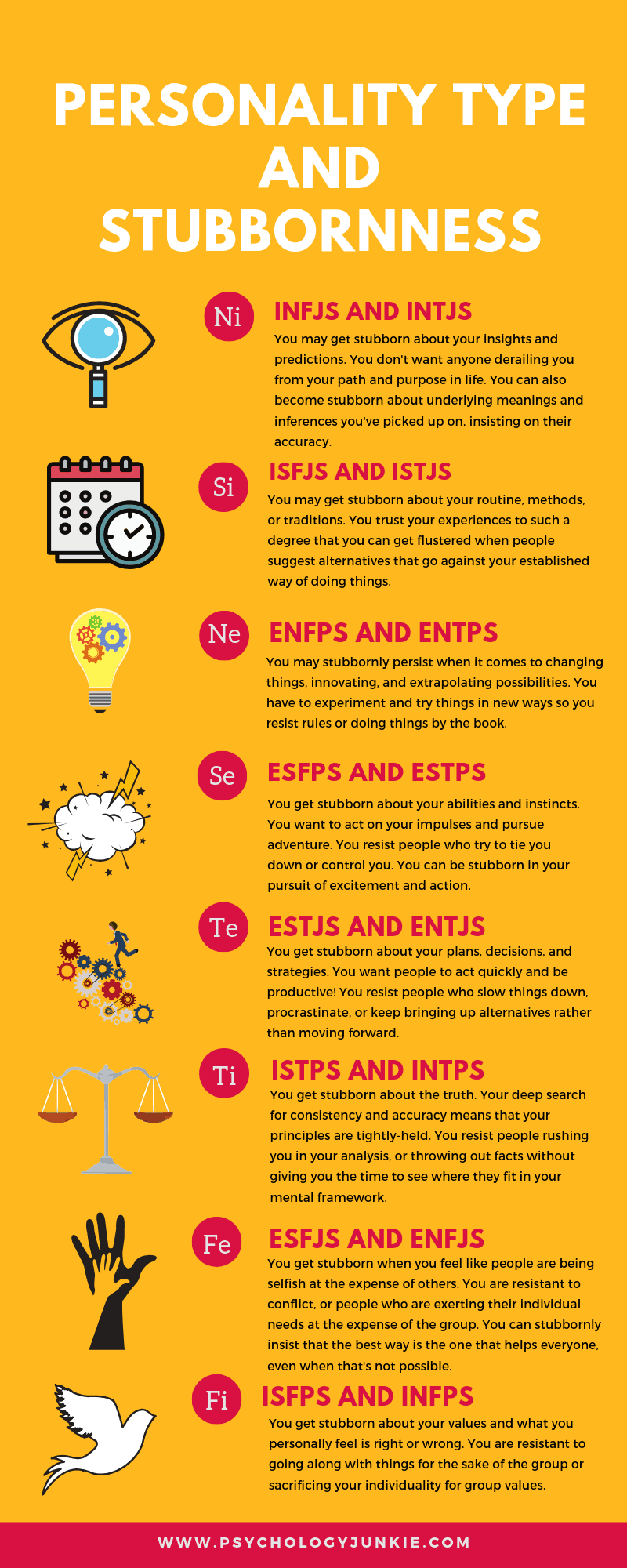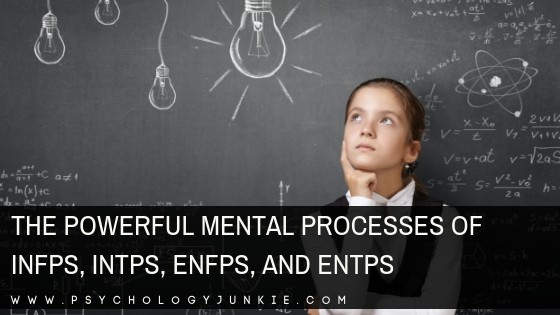Here’s What You’re Stubborn About, Based on Your Myers-Briggs® Personality Type
Have you ever been accused of being stubborn? Do you ever feel like other people are just getting in the way of your goals, plans, or desires? When it comes to our personality types, each of us tends to become stubborn about things involving our dominant function. For example, if you’re a dominant intuitive (ENxP or INxJ) you tend to feel stubborn about your insights, inferences, and the hidden meanings you’ve discovered. If you’re a dominant thinking type (IxTP or ExTJ) you tend to get stubborn about your logic or the accuracy of your opinions. When we’re unhealthy, immature, and/or young we tend to have more issues with stubbornness than usual. These issues can mellow out as we get older and we learn to appreciate other perspectives more, but knowing about them early on can help us to see when we’re getting in our own way! So let’s take a look at the different ways each type gets stubborn.
Not sure what your personality type is? Take our new personality questionnaire!

Here’s What You’re Stubborn About, Based on Your Myers-Briggs® Personality Type
The ENFP
ENFPs have a unique ability to interpret relationships across contexts. They can experience two disparate situations and find something that ties them both together. They can also infer meaning and connections that aren’t directly stated. This “reading-between-the-lines” ability can make them insightful and creative, but it can also trip them up. They can become very stubborn about their interpretations of what’s going on around them. For example, they might think they’ve read someone’s mind and move forward based on their inference rather than checking to see if their interpretation is actually accurate. Or they might be insistent on innovating or changing something that is working perfectly fine as it is just because change is so compelling to them.
ENFPs are very individualistic people who enjoy going after their dreams, ideals, values, and desires. While this is a good thing, it can also become an inflated preference. They can be resistant to being influenced by anyone else, which can make them self-absorbed and dismissive. This is typically more prevalent among young or immature ENFPs – as ENFPs grow and mature, they become more patient, inclusive, and aware of other people’s desires.
During times of stress, ENFPs can fall into the trap of evaluating everything as either completely good or completely bad. They might dig their heels in on certain beliefs and values and refuse to hear other people’s opinions. They may appear self-righteous or uncharacteristically cautious and single-minded.
Read This Next: 3 Weird and Wonderful Secrets of the ENFP Personality Type
The ENTP
ENTPs enjoy brainstorming, debating, and extrapolating alternatives and hypothetical possibilities. They consider themselves open-minded but also rational. While their gifts are able to make them innovative inventors, philosophers, and teachers, they can also get them into trouble at times. They can become so focused on challenging the status quo or playing devil’s advocate that they bend logic to fit their agenda or to “win” the argument. They can also become so locked on doing things in new ways that they “reinvent the wheel” and waste time on needless innovation.
During stress, ENTPs can become rigid about adhering to certain principles and models without being as flexible as usual. During these times they will seem more critical, sharp-tongued, and harsh. They can also develop tunnel-vision about how things should be done, getting lost in details or over-preparation.
Read This Next: 10 Things You Should Never Say to an ENTP
The INFP
INFPs are sincere, dedicated individuals who hold firmly to their causes and values. They spend their lives considering matters of worth, good and evil, and importance. What is life really all about? Who says what’s right and wrong and what is really true? What’s right to them? When INFPs settle on their values and causes, they do so with loyalty and steadfast conviction. While this can be a good thing, it can also cause problems if over-done. They can rigidly adhere to their beliefs and desires, becoming reactionary to things they categorize as wrong or evil. They can hold people up to standards that are unrealistic and then become disappointed when those people inevitably fail. When people argue about values and ethics they can become self-righteous and hurt rather than openly giving the other party a chance to express themselves. As they grow and mature they become more open to these types of discussions.
During stress, INFPs can become overly fixated on the accuracy of their inferences and ideas without taking the time to test their ideas in the real world. The result is that they can become “armchair experts” based on hypothesis rather than real-world experience. During extreme stress they can be more critical, dogmatic, and argumentative than normal – too fixated on their logic to have a productive dialog.
Read This Next: A Look Inside the INFP Mind
The INTP
INTPs like to have a thorough understanding of something before they move forward on a decision. They like to look at all the facts, consider all the angles, and weigh leverage points and pros and cons. This can be a good thing because they usually aren’t impulsive or reckless. But it can also make them appear stubborn to more quickly-decisive types. They can insist on taking their time, delaying deadlines or putting off decisions until they feel they have satisfied their curiosity and need for knowledge. They also have very precise inner models and principles and are very insistent about the accuracy of what they believe. More unhealthy INTPs can shut out any information that doesn’t fit with their model of how things works. They may also “bend” facts to fit with their principles.
During stress, INTPs can become too convinced of the efficacy of their ideas without trying them out in the real world. They might get lost in hypothesizing and become “armchair experts” on a subject without putting their ideas to the test with practical application. They can be very stubborn about their inferences and ideas and shut out opposing views.
The ENFJ
ENFJs are extremely observant of people and their needs, emotions, values, and desires. They thrive on honest, expressive communication and enjoy getting people to open up to them and share their lives with them. They enjoy listening, counseling, advising, and comforting. While this can be a good quality, it can be misinterpreted or taken too far. Some people can find the ENFJs concern overbearing or meddling. ENFJs can also become very sure of someone’s potential, their path, or how they should handle relationships and decisions. Because they tend to trust their insights and instincts about people they can be very stubborn about what they think a group “should” do or what values people “should” support. This can seem pushy, especially to more individualistic types.
During stress, ENFJs want to have a sense of control and a clear path for themselves. They may become pushy about decisions without fully processing all their reasons for doing so. They can get caught up in analyzing their intuitive insights, but forget to process the concrete facts and details. For example, they might decide that a company should take part in a conference without realizing that the budget and resources aren’t readily available.
The ENTJ
ENTJs are decisive, hard-working, and visionary. They are often movers and shakers in the business world, strategically maneuvering their careers to the top of the corporate ladder. While their skills can definitely be an advantage, they can also have some unintended negatives. ENTJs can be so sure of their logic and rationale for making a decision that they shut out opposing views or appear condescending to people bringing up the personal reasons a decision might not work. If they develop a plan it can be difficult for them to change course, especially if they are at an average or unhealthy level of maturity. They might insist on people “getting over” their feelings or make comments about their feelings being irrelevant. They can also become rigid in their thinking, stubbornly adhering to models and principles they’ve adopted.
During stress, ENTJs can also become more stubborn about what they perceive as right or wrong. They may become very black-and-white about what’s good or bad and develop a self-righteous demeanor. Anyone who isn’t on their side is “bad” and they can develop a martyr complex if they don’t feel like anyone supports their values. These feelings tend to dissipate as their stress levels go down.
The INFJ
INFJs are perceptive and insightful, focusing on the long-range implications of everything that happens around them. More concerned with the future than the present, they aim to foresee what will happen and how to influence the future in a positive way. While their foresight can be uncannily accurate, it’s important for them to take facts and concrete details into consideration. INFJs can become very stubborn about their perceptions and visions, insisting that the future they see WILL happen. They can develop plans that they believe in with 100% dedication. If anyone contradicts their plans they can become oppositional or else withdraw and carry out their plan under-the-radar.
During stress, INFJs can become over-accommodating to other people and overwhelmed by the needs and emotions of others. They feel that in order to process their insights the world around them must be in complete harmony. They can become co-dependent, obsessed with meeting others’ needs, and emotionally frustrated. Their need to “make things right” for people can appear overbearing and their insistence on fixing things can border on stubborn.
Read This Next: A Look Inside the INFJ Mind
The INTJ
INTJs are visionary and strategic, and aimed at uncovering patterns and themes that will impact the future. They enjoy studying philosophies, contemplating life’s mysteries, and planning out pathways towards progress. These types are often at the frontlines of research and technological progress. While their insights can be valuable and revolutionary, they can also become very stubborn about them. When people question their predictions they can become condescending and impatient in their responses. If they don’t balance their views with real-world experience and facts they can develop one-sided, mystical ideas that lack factual basis. At an extremely unhealthy level, they can become fixated on complex ideas and lose sight of “common sense.”
During stress, INTJs can become rigid with their logic and sense of order. They might insist on their environment being organized a certain way or become hyper-focused on cleanliness and organization.
Read This Next: 10 Things That Terrify INTJs
The ESFP
ESFPs are enthusiastic, practical, and action-oriented. They yearn for a life full of variety and adventure and detest being sedentary or bored. Their impulsiveness and bravery can be a good thing, but it can also go too far. They can become stubborn about their actions, giving the impression that they are “immune to danger” and that they are realistic enough to handle the risks. People who caution them to slow down or check in with their values can seem stifling to the ESFP and they can dig their heels in even more. They can also seem stubborn about facts and perceptions; prizing realistic facts and data over anything theoretical. People who bring up far-reaching theories or symbolism may be dismissed because the ESFP might think these things are too superstitious or unrealistic.
During stress, ESFPs can become uncharacteristically introspective and gloomy. They might become stubborn about the future and all the terrible things they see happening then. Usually energetic and optimistic, during these times they seem pessimistic and visionary in a depressing way.
The ESTP
ESTPs are daring, resourceful, and pragmatic individuals. They are quick to respond to emergency scenarios and enjoy situations that make them think on their feet. Their ability to improvise and trust their instincts can be a huge benefit. That said, sometimes they trust their instincts too quickly and can be reckless and stubborn about their abilities. They can cling to the idea that they are indestructible and “leap before they look” much to the dismay of people who have asked them to take caution. They can be stubbornly daring, throwing caution to the wind and implying that the more careful path is for “sissies.”
During stress, ESTPs can become stubborn about what they see as a dismal future. Especially during chronic or extreme stress, they can become uncharacteristically withdrawn, introspective, and focused on forecasting the future. They can be very sure about “inevitable” catastrophe during these times.
The ISFP
ISFPs are guided by their personal values and strive to live in accordance with their unique sense of purpose. They want to practically help people and the causes that they believe in. It’s important for them to make a tangible improvement in the world. Where ISFPs can be stubborn is in the values that they hold dear. They tend to dig in their heels in support of their cause or ideal and can see people who oppose their views as “wrong” or “bad.” They can become very reactionary about what they perceive as wrong in the world and misjudge others as being apathetic.
During stress, ISFPs can become uncharacteristically focused on order and logic. They can be more insensitive to other people and develop a hard, rational look at things in the world. Focused on productivity and getting things done, they will have less patience than usual for people’s feelings. They can become too wedded to their logic and become incapable of having a reasonable dialog with others.
The ISTP
Realistic and rational, ISTPs pride themselves on trusting facts and thinking things through. Where they can be stubborn is with their insistence on pure accuracy. They can be very sure of their logic – shutting out ideas, values, or opinions that don’t fit in with their mental model of how things work. They can also be stubborn about analyzing a situation in-depth before taking action. While they think quickly in crisis situations, they tend to take their time on long-term decisions. They want to absorb all the facts and reflect on all the details and logic before getting stuck in a decision they might later regret. During these times they can appear hesitant and resistant to people waiting on their answer.
During stress, ISTPs can become stubborn about how things are organized in their environment. They can be very particular about cleanliness or how their desk is organized and can get annoyed with people who impede on their space.
The ESFJ
Friendly and community-minded, ESFJs believe in caring for others and organizing a better world. They are highly attuned to other people’s needs and pay attention to the little details that bring people joy. They feel best when their surroundings are harmonious and there is a sense of teamwork. They can be so anxious for everyone to get along that they stubbornly try to “fix” everyone’s feelings. Emotionally unhealthy ESFJs get annoyed at people who are causing disruption, even if that disruption is a good thing. Healthy ESFJs realize that sometimes conflict is a good thing and will try to create an atmosphere where everyone is able to openly express their emotions.
ESFJs can also appear stubborn when it comes to their values and beliefs. The morals of the ESFJ are usually very important to them and they can be very outspoken in defense of them. When they are crusading for a cause they may appear “preachy” in their efforts to get other people on board.
During stress, ESFJs tend to trust their experience and past impressions the most. They may stubbornly insist on their way, and shut down alternatives or innovative methods. During these times they are more fixated on their routine and are afraid to venture out of their comfort zone.
The ESTJ
Pragmatic, action-oriented, and determined, ESTJs thrive when they are productive and focused on their goals. These types like to keep busy with their objectives because they feel that through hard-work and achievement they can best take care of their communities or families. Because ESTJs value hard-work and productivity to such a high degree they can be very stubborn about their decisions and plans. They don’t like dilly-dallying around or wasting time, so if they’ve come up with a plan that seems effective they want to move forward quickly. People who procrastinate, offer a lot of alternatives, or can’t make up their mind tend to get on their nerves during times like this.
During extreme stress, ESTJs can become more emotionally sensitive than usual. This can appear like a focus on a cause or moral righteousness. They might become more stubborn than usual about what’s right, ethical, or good and try to impose their beliefs on other people. If others don’t get on board they can feel attacked, isolated, and victimized. This feeling tends to dissipate quickly once their stress becomes more manageable.
The ISFJ
Empathetic, detail-oriented, and grounded, ISFJs are a stabilizing force in a chaotic world. They care deeply for people and try to show their devotion through attending to the details that make life meaningful or more comfortable. These types can appear stubborn when it comes to their methods. They like using familiar approaches when it comes to problem-solving and planning. They trust mentors and tried-and-true practices and techniques. They may insist that the way it’s always been done is the best way and can be suspicious of change, theories, or hypothetical alternatives.
During stress ISFJs can be especially resistant to change. They might feel overwhelmed by details and negative possibilities and try to avoid risk at all costs. To others it can seem like they’re stubbornly clinging to their routines and hiding themselves away.
The ISTJ
Resourceful and down-to-earth, people value ISTJs because they always have a plan and they stick to their guns on things. They believe in being honest and hard-working because they feel a strong sense of responsibility for the people they love or the commitments they’ve made. Because stability is so important to ISTJs they can seem stubborn about their routines and methods. They like working with what they know and they are skeptical of new alternatives unless they have strong logical reasons to try them out.
During stress, ISTJs tend to be especially resistant to change. They will become more isolative and obsessed with getting the facts straight. During times like this they tend to feel overwhelmed and flustered. To others it might seem like they are clinging to their routines and habits and are increasingly averse to change. This feeling tends to dissipate as their stress decreases.
Read This Next: 10 Things That Excite the ISTJ Personality Type
What Are Your Thoughts?
Do you agree with this article or disagree? Let us know your experiences and insights in the comments!
Find out more about your personality type in our eBooks, Discovering You: Unlocking the Power of Personality Type, The INFJ – Understanding the Mystic, and The INFP – Understanding the Dreamer. You can also connect with me via Facebook, Instagram, or Twitter!
Sources:
The Shadows of Type by Angelina Bennett
Understanding Yourself and Others: An Introduction to the Personality Type Code
The above links are affiliate links. If you purchase the books listed I get a small percentage that I can use to support this web site.
















Why is this being peddled as science or fact?
As an INFJ, I completely agree with the analysis of my type relative to stubbornness. One characteristic and behavior in particular rings very loudly, “If anyone contradicts their plans they can…withdraw and carry out their plan under-the-radar.” How often I did just that then had to face the ire of a parent or manager for being defiant. What was particularly satisfying was being declared correct in the final analysis — but, “don’t do that again!”